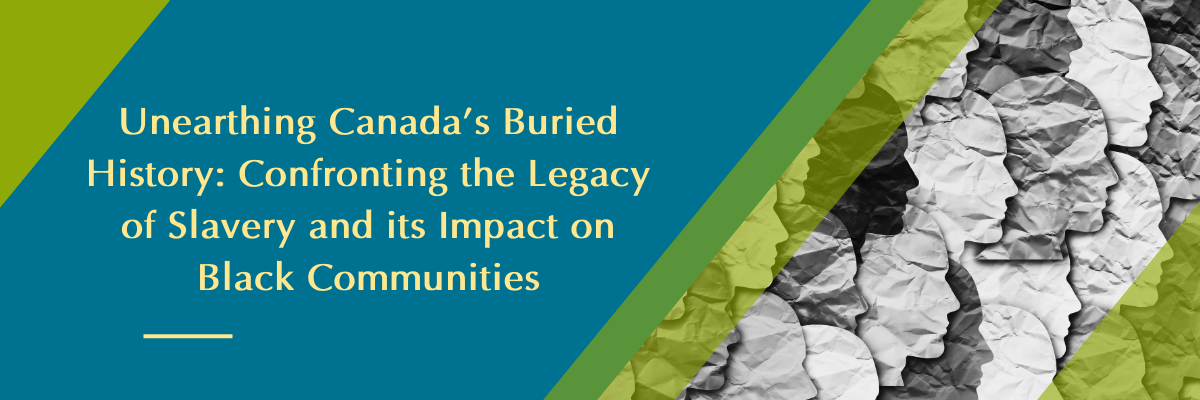
For many, Canada’s relationship to chattel slavery, especially the enslavement of Black people, starts and stops with the Underground Railroad, a well-known symbol of freedom, offering hope and refuge to enslaved Black individuals escaping the United States. However, a lesser-known, uncomfortable period of history often remains shrouded in silence. Spanning 200 years before the establishment of the Underground Railroad, Canada witnessed the prevalence of slavery. Only a critical eye on this yet understudied aspect of the country's past will allow us to take account of its lingering effects on Canadians and, especially, Black people in Canada, today. As we approach the recognition of Emancipation Day August 1 and local celebrations before and after, we must also commit to a better understanding of our true history, on this and every other day.
Although slavery in Canada saw its official end with the British abolition of slavery in 1833, it has left an enduring mark on Canadian society. The mechanisms of slavery gave rise to race-based ideologies, creating a deeply rooted consciousness that perpetuated the subjugation of Black people. Racism remains prevalent today in various forms, from microaggressions to systemic surveillance, emphasizing the need for a deeper understanding of its historical roots.
Afua Cooper highlights how slavery played a key role in shaping race constructs, portraying Black individuals as inferior and subservient while elevating white individuals to dominant positions. These entrenched legacies still perpetuate social inequalities, for example, higher unemployment rates for educated Black women compared to their white counterparts and the disproportionate placement of Black children in foster care.
The "Unfunded: Black Communities Overlooked by Canadian Philanthropy" report, released by the Network for the Advancement of Black Communities and Carleton University's Philanthropy and Nonprofit Leadership program, sheds light on the relationship between Canadian philanthropy and Black communities. Despite comprising 3.5% of the population, Black communities receive minimal support from Canadian foundations. Black-led organizations received a mere 0.03% of funds, and Black-serving organizations received only 0.15% in the fiscal years 2017 and 2018.
The report calls for a dedicated Foundation for Black Communities to address the specific needs of Black communities in Canada and emphasizes the importance of collaboration among foundations to create lasting change and ensure equity and agency for Black communities.
Acknowledging the history of slavery in Canada and its impact on Black communities, it is crucial to examine the charitable sector's role in perpetuating inequitable support for Black communities and B3 organizations. Whether intentional or unintentional, the sector has been complicit in this regard and must adopt an equity lens and decolonizing approach to its activities. This self-inquiry is essential in understanding how the charitable sector has contributed to disparities and what actions can be taken to rectify the situation. By embracing self-awareness and introspection, the sector can pave the way for meaningful change and more equitable support for Black communities and B3 organizations in Canada.
Transcending the myth of a gentler past, the legacy of racism, the resilience of those who resisted, and the quest for justice shape the nation's collective identity. It is of utmost significance for Canadians to embrace this history and wholeheartedly listen to the voices that have endured suppression for countless centuries, with their descendants still grappling with the repercussions of these unjust practices. As social purpose organizations it is our duty to actively listen and amplify the black voices and the voices of the black led organizations in the community.
By understanding and acknowledging this historical reality, we can foster empathy and compassion, paving the way for healing and reconciliation as a nation. It is incumbent upon us to create a society that honors the past, embraces diversity, and works towards dismantling the lingering effects of inhumane customs that continue to impact lives to this day.
LOCAL EMANCIPATION DAY EVENTS
1st August : LBHCC-UWO Emancipation Day Celebration
10th August : AgentsC Inc.'s 3rd annual Giving Black virtual conference
26th August: Emancipation Day Celebration at Victoria Park
References and Resources
1. Bonds of Alliance: Indigenous and Atlantic Slaveries in New France, Brett Rushforth, University of North Carolina Press, 2012.
2. Canada's Forgotten Slaves: Two Hundred Years of Bondage, Marcel Trudel, translated by George Tombs, Véhicule Press, 2013.
3. Canticles I, George Elliott Clarke, Guernica Editions, 2016.
4. Directions Home: Approaches to African-Canadian Literature, George Elliott Clarke, University of Toronto Press, 2012.
5. Ebony Roots, Northern Soil: Perspectives on Blackness in Canada, Ed. Charmaine Nelson, Cambridge Scholars Publishing, 2010.
6. Emancipation Day: Celebrating Freedom in Canada, Natasha Henry, Natural Heritage Books, 2010.
7. The Black Loyalists: The search for the Promised Land in Nova Scotia and Sierra Leone, 1783-1870, James Walker, University of Toronto Press, republished in 2017.
8. The Hanging of Angélique: The Untold Story of Canadian Slavery and the Burning of Old Montréal, HarperCollins Publishers, 2006.
9. The Journey Continues: An Atlantic Canadian Black Experience, Craig Marshall Smith, Black Green and Red Educational Products, 2012.
10. Towards an African Canadian Art History: Art, Memory, and Resistance, Charmaine Nelson, Captus Press, 2018.
11. "Dismantling Racism in Philanthropy." London Black History Co-operative and CEE Centre for Young Black Professionals. https://lbhcc.ca/partnership/dismantling-racism-philanthropy
12. "Unfunded: Black Communities Overlooked by Canadian Philanthropy." Network for the Advancement of Black Communities and Carleton University's Philanthropy and Nonprofit Leadership program. https://www.forblackcommunities.org/assets/docs/Unfunded-Report.pdf
13. "What We Don't Know About the History of Slavery in Canada and Why We Don't Know It." The Star. https://www.thestar.com/news/canada/what-we-don-t-know-about-the-history...
14. Odysseys Home: Mapping African-Canadian Literature, George Elliott Clarke, University of Toronto Press, 2002.
15. Policing Black Lives: State Violence from Slavery to the Present, Robyn Maynard, Fernwood Publishing, 2017.
16. Viola Desmond's Canada: A History of Blacks and Racial Segregation in the Promised Land, Graham Reynolds, Fernwood Publishing, 2016.
